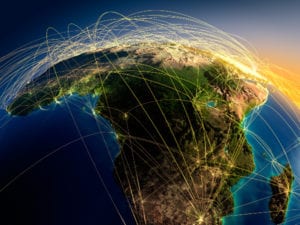In South Africa’s post-Covid-19 landscape, information and communications technology (ICT) will be a vital component in bridging major socio-economic inequality gaps. This requires a comprehensive digital transformation of society driven by private and public sector initiatives, says Steve Briggs, chief commercial officer, SEACOM South Africa.
Across the world, and now more recently in South Africa, broadband access has become better, faster and cheaper. Investments in local data centres are also making cloud-based services a secure, mainstream choice for a growing number of industries, which include the construction sector and government entities responsible for implementing and managing complex infrastructure delivery models. “As data volumes rise to unprecedented levels, with a corresponding demand for real-time access of information flows, the way ICT is managed and implemented is critical,” says Briggs. Going forward, the design, execution, operations and maintenance of infrastructure will be driven across the board by smart technologies. The key question, though, is how many of South Africa’s approximately 257 municipalities have a futureproof ICT policy framework in place, supported by the necessary funding? Smart cities and smart governments need ICT for initiatives like Wi-Fi roll-outs, traffic management systems, utility automation and remote monitoring, e-services (smart metering/ billing), and financial management and reporting. “Our commitment as a leading local and international ICT specialist is to create tailored digital platforms backed by our multimillion-rand investment in a national fibre network,” Briggs explains. To date, SEACOM’s South African terrestrial network runs along major arterial routes that include the N1 between Johannesburg and Cape Town, the N3 from Johannesburg to Durban, and the N7 Bloemfontein to East London leg. “In subsequent phases, we will continue to expand the fibre ring to ensure that all major towns are ‘lit up’,” says Briggs.First submarine cable
A Mauritius-based multinational, SEACOM launched Africa’s first broadband submarine cable system in 2009 along the continent’s eastern and southern coastline.“Close to two years ago, SEACOM was offering lightning speeds of up to 1.6 terabits per second. We’re now close to doubling that,” he points out, illustrating the pace of ICT advancements.
“It’s also interesting to note that a 1 GB per second uncapped line now costs around R15 000 per month. In 2018, it was closer to R70 000.” SEACOM provides a range of best-in-class enterprise connectivity solutions that extend from high-speed fibre or wireless internet access, to Ethernet links, direct internet access and cloud services. Wholesale data facilities are sold to internet service providers, alongside SEACOM’s direct business-to-business solutions for government and industry.






